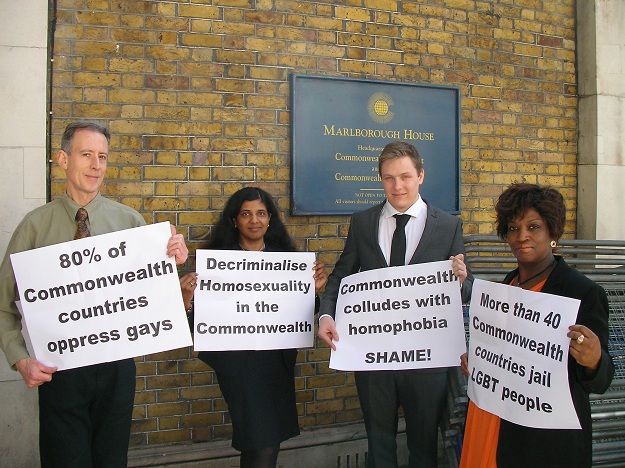
Of the 53 member nations of the Commonwealth, 41 criminalise consensual same-sex behaviour between adults. They make up more than half the countries in the world that totally prohibit homosexuality. Seven of these Commonwealth states stipulate life imprisonment. Two have sharia law in certain regions – Pakistan and Nigeria – where the maximum penalty is execution.
Homophobic criminalisation, prejudice, discrimination and violence is routine – and occurs with impunity – in 80 per cent of Commonwealth countries. Governments of these nations reject dialogue with lesbian, gay, bisexual, transgender and inter-sex (LGBTI) organisations.
The biennial Commonwealth Heads of Government Meeting (CHOGM) is no better. It refuses to even discuss the widespread violation of LGBTI human rights.
It was only as recently as 2011 that a Commonwealth Secretary-General, for the first time ever, spoke out against homophobia and this was only in response to my public rebuke of decades of Commonwealth silence and inaction on The Guardian website. Nevertheless, many of us saw this pioneering declaration as a positive turning point. It was. However, we’ve also experienced a fair degree of subsequent disappointment.
Despite the recent recriminalisation of homosexuality in India, the homophobic witch-hunts in Cameroon, gay-bashing attacks in Jamaica and the draconian new anti-gay bills in Uganda and Nigeria, the Commonwealth Secretary-General, Kamalesh Sharma, has mostly been muted or totally silent.
The global LGBTI lobby group the Kaleidoscope Trust explains in its new report why and how he should be challenging these human rights abuses. Entitled ‘Speaking Out: The rights of LGBTI Citizens from Across the Commonwealth’, it has been compiled with input from LGBTI people in many Commonwealth countries. It presents shocking, graphic evidence of the immense oppression they suffer. Indeed, one of the most powerful aspects of this report is the first-hand testimony from the victims of homophobia and transphobia:
“I have lost two teeth, had my family property invaded and car damaged by two masked men… I have had stones thrown at me, experienced simulated gun shots, insults and physical harm on public transportation.”
Caleb Orozco, Belize
“A mob had gathered there saying they wanted to kill gays. I was getting into a public minibus and the conductor started to beat me. Then everyone started beating me.”
Anonymous, Tanzania
“I was attacked, beaten and paraded naked on the street of Dakwo village, Abuja, in July 2013 on the allegation that I am gay. People brought several video camera and mobile phone to record my nakedness. This inhuman, degrading treatment has ruined my life and I have been banished from Dakwo village.”
K. C., Nigeria
With a prestigious foreword by the former Commonwealth Secretary-General Sir Shridath Ramphal and a damning introduction from the ex-head of the Commonwealth Secretariat’s Human Rights Unit, Dr Purna Sen, the report is an authoritative, illuminating call to action.
Sen notes that criminalisation and hate crime are not the only persecutions suffered by Commonwealth LGBTI citizens. There is also widespread discrimination: the denial of “equal access to rights, education, employment, housing and health care”. These abuses happen in defiance of the human rights obligations enshrined in the Commonwealth Charter. Based on the evidence amassed, the report urges all Commonwealth governments to repeal legislation criminalising same-sex behaviour and, in the meantime, to agree a moratorium on the enforcement of any such existing laws.
It also calls on member states to engage in dialogue with their LGBTI communities and to approve the formation of a Commonwealth-wide LGBTI association with formal consultative status. The biggest, most challenging demand is the discussion of LGBTI equal rights at the next CHOGM. We live in hope and, if there is any justice, this commendable, excoriating report will prompt the Commonwealth to ensure that this happens.
Speaking Out: The rights of LGBTI Citizens from Across the Commonwealth
Kaleidoscope Trust; http://kaleidoscopetrust.com/speaking-out 80pp





